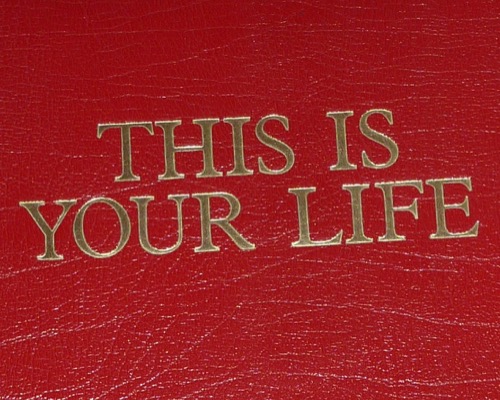Big Red Book
Celebrating television's This Is Your Life
Alice STERN (1902-1992)

THIS IS YOUR LIFE - Alice Stern, concentration camp survivor, was surprised by Eamonn Andrews outside the BBC Television Theatre.
programme details...
- Edition No: 228
- Subject No: 229
- Broadcast date: Thu 10 Oct 1963
- Broadcast time: 8.35-9.00pm
- Recorded: Mon 30 Sep 1963
- Venue: unknown
- Series: 9
- Edition: 2
on the guest list...
- Gina Haurowitz
- Mrs H Libockowitz
- Mrs F Billotta
- Felix Morel
- Mrs A Parnos
- Hana Pravda
- Doris Littell Filmed tribute:
- Ilse Krause Recorded tribute:
- George Pravda
production team...
- Director: Michael Goodwin
- Producer: Vere Lorrimer
- Executive Producer: T Leslie Jackson
saluting the armed forces


Alice Stern, tx. 10 October 1963
Similar to the Coward episode, there is no surviving programme, no script, no production file, no audience research report and virtually no reviews. The BBC's Subject Index cards under the subject of 'Concentration Camps' record the show simply as '10.10.63. This is your life. Alice Stern. T/r in camps for Jews. etc.'. There was a review in the Jewish Chronicle, but even here the coverage was surprisingly understated. Under the title of 'No Punches Pulled', a reference not to This Is Your Life but to a documentary series, The Jew in the World, which was showing on ITV, the story of Stern's life was simply one of several of 'Jewish-interest' which could be found that week 'all over the networks'.
On BBC the subject of This Is Your Life was a concentration camp survivor, Mrs Alice Stern, now living in London. Viewers heard how her amazing courage and will to live helped her to triumph in the face of overwhelming odds.
The only additional guidance to the programme in the BBC WAC comes from the Programmes as Broadcast (a detailed account of the transmission times and content) which at least reveals the names of those featured on screen that evening. These included not only Andrews and Stern, but Miss Gina Haurowitz, Mrs H Libockowitz, Mrs F Billet, Felix Morel, Mrs A Parnes, Mrs Hana Pravda, Doris Littell, with four women and two men as 'extras'. Mrs Ilsa Krause featured in a film sequence, and George Pravda in a recorded insert. Even this brief list offers further evidence of the increased presence of the Holocaust survivor. Hana Pravda, a former prisoner in Auschwitz, had recently been seen in the Studio 4 production of Address Unknown, and would be seen again as Emma Cohen, a concentration camp survivor (one never named as Jewish) in Survivors (1975-1977), Terry Nation's vision of post-apocalyptic Britain. She would later appear in QB VII as a Holocaust survivor alongside her husband, George Pravda, another recognisable and familiar face on British screens, including a part in The Password Is Courage, the film version of the life of Charles Coward, and the lead in The Unplayed Part (tx. 2 October 1960) one of the earliest of BBC plays to be set in a concentration camp.
Stern's appearance completed the progression from rescuer to liberator to inmate to survivor that had started eight years before. In starting with Ida Cook, the 'Scarlet Pimpernel' figure, and positioning her exploits within a specifically British and literary tradition, the programme foregrounded a life story of heroic rescue rather than one curtailed by the horrors. Similarly Ryder's story was very much about heroism, and one again undertaken by a young woman in terrible circumstances. With Glyn Hughes the pattern remained constant even as it changed, with the rescuer now also being a liberator. In each of these programmes at least one survivor had been present onstage, but they were not there to speak of their own experiences but rather to honour the actions of the principal guest. When it was Charles Coward's turn to take centre-stage, the remaining documents hint at the fact that for the first time the experiences of life in the camps and Nazi-occupied Europe more generally were at least being actively remembered and sought. That was affirmed three years later when Stern became the first victim to be the focal point for the camera, telling of her life to an audience of around 10 million people.
From the vantage point of 50 years later, given the interest in This Is Your Life and the heightened awareness of the Holocaust, these last two programmes seem the most remarkable, not because they happened but because of the lack of press coverage they were afforded and the absence of any recordings or records remaining in the BBC's archives. It is hard to imagine that they would not be preserved now, but their absence is indicative of just how far removed the present day is from the 1960s in terms of the retention of broadcast material and the Holocaust. It is an absence that highlights the marketing, publicity and analysis that preceded and followed Holocaust 14 years later.
Series 9 subjects
Stratford Johns | Alice Stern | Robert Boothby | Bessie Love | Joan Stanton | Harry Worth | John Dodd | Ralph ReaderAlbert Guerisse | Margaret Lockwood | Franklin Day | Frederick Spencer Chapman | Thora Hird | Evelyn Bark
Madge Watson and Elsie Wood | Petula Clark | Derek McCulloch | Bert Matthews | Ted Moult | Dot Palmer | Teddy Winn
Barbara Mullen | Paul Burrough | Sydney Scroggie | Ninette de Valois | Dominique Pire | Olivia de Havilland | Mary Hawkins